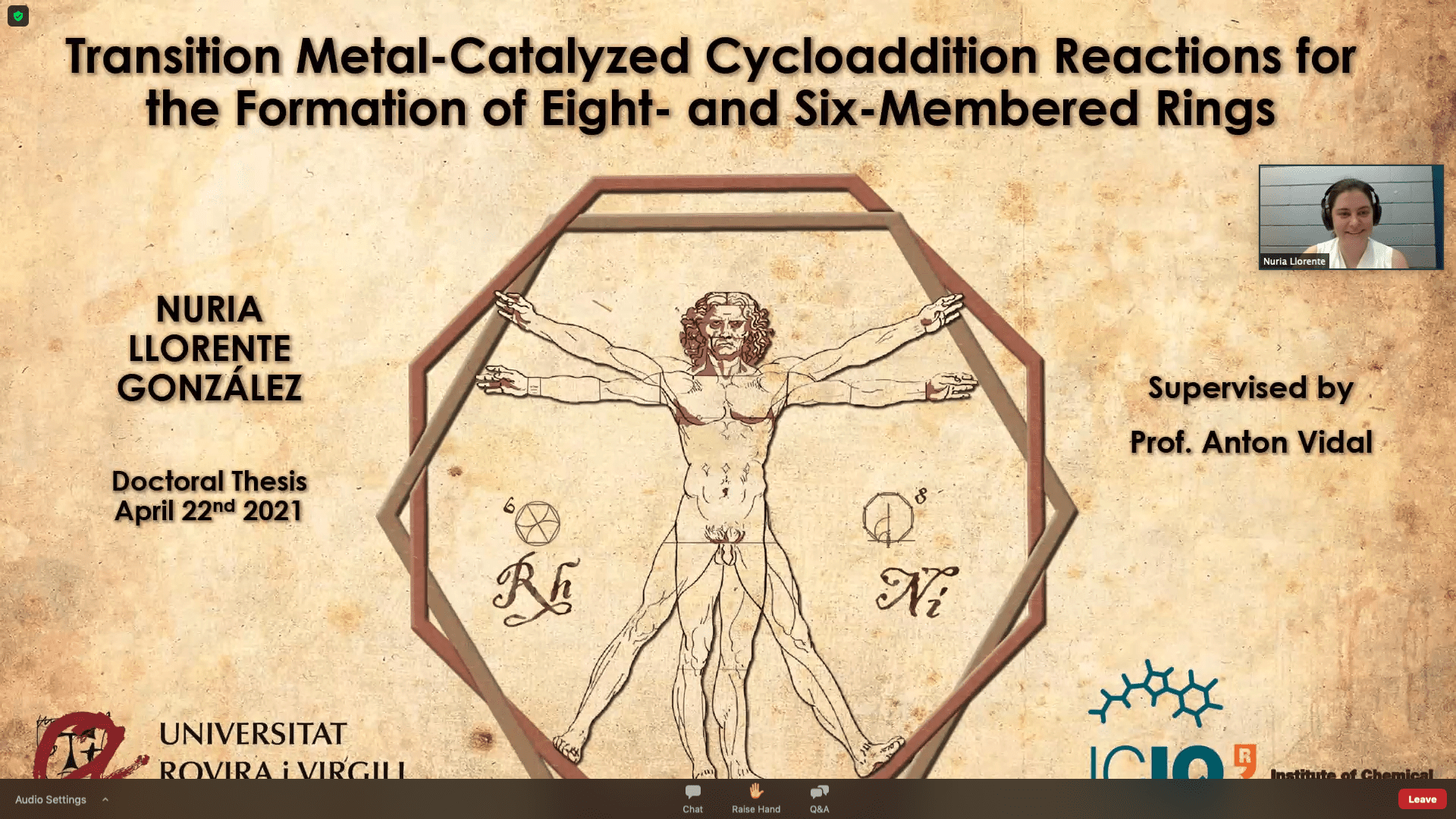Congratulations, Dr. Llorente!
Nuria Llorente, PhD student under the supervision of Prof. Anton Vidal, has defended her PhD thesis entitled “Transition Metal-Catalyzed Cycloaddition Reactions for the Formation of Eight- and Six-Membered Rings” (assigned to the Organic and Analytical Chemistry Department of the Universitat Rovira i Virgili) publicly on April 22nd.
The members of the evaluation committee were: Prof. M. Asunción Barbero (Universidad de Valladolid), Prof. Daniel Sainz (Universitat de Barcelona) and Prof. Agustí Lledó (Institut de Química Computacional i Catàlisi).
Dr. Llorente was born in Barcelona but her family moved to León shortly after. She obtained her degree in Chemistry from the Universidad de Valladolid and in October 2015 she began her master’s degree in the group of Prof. Vidal (ICIQ) where she also pursued her PhD. Since March, she has been working at AMRI Global as an R&D Scientist developing synthetic processes of active molecules. She likes organising plans with friends like gastronomical hikes (as she puts it) and going to the beach.
Why did you become a scientist?
I knew I loved chemistry very early on: It was my favourite subject in high school. However, it was during my Erasmus in Zurich that I had my first experience in a research lab. I loved the research environment, being surrounded by very curious people who are always questioning themselves. I also enjoyed the challenges and the excitement of discovering something new.
What ICIQ moment you´ll never forget?
First, all the moments I spent with my labmates. I enjoyed working in the lab with them, the good and the bad days, because as we usually liked to say “the important thing is that we love each other.” I also remember the Kahoot! Quiz from the ICIQ Christmas lunch, it was fun… and my team won!
What advice do you have for someone who’s starting their PhD now?
I would tell them that you have to keep in mind how necessary life-work balance is. During the thesis, it is easy to forget about the outside world and spend 24/7 in the lab. You should make plans to disconnect, it will be good for you. In addition, many of the students are not from Tarragona, and the region has a lot of things to offer, so you should go out and enjoy it.
Have you ever been emotional over an experiment? Why?
Not about one experiment in particular, but I loved using the High Throughput Experimentation (HTE) unit. It helped me a lot in my research. Without it, I think I wouldn’t have gotten several of the results in my thesis.
Which is the most important skill you learnt during your PhD?
Troubleshooting under pressure on a daily basis. I think that was the most important skill I learnt. It was useful at the experimental-chemistry level, but also for everyday life.
What applications can your thesis have in the future?
The generation of knowledge is always useful. A deeper understanding of Nickel-catalysed compounds could prove useful for the synthesis of bio-active molecules.
What is your favourite molecule?
Any kind of cyclooctadiene, because those are the compounds I have been working hard to synthesise these last five years.
If you were a piece of lab equipment, what would you be?
I would be a glovebox, no doubt. I was the person responsible in the group for keeping it in good shape, so during these past years I spent most of my time either working in the glovebox or worrying about it.
Related news

Let's create a brighter future
Join our team to work with renowned researchers, tackle groundbreaking
projects and contribute to meaningful scientific advancements








 20-12-2024
20-12-2024 


















